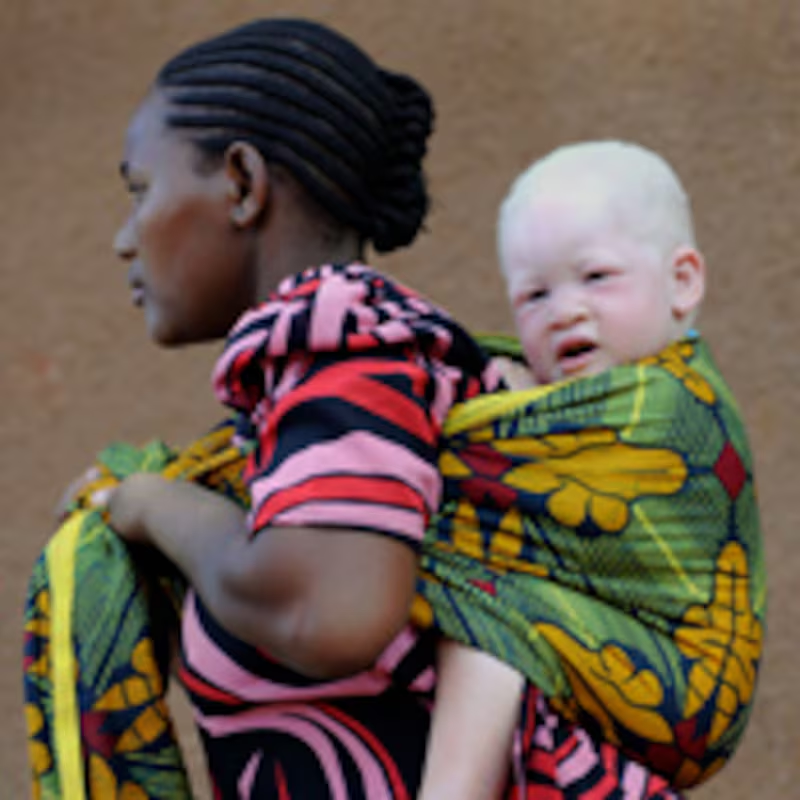
As a reporter, I've witnessed the stomach-churning results of man's inhumanity, and I’ve learned to steel myself against despair. But just as often, I've encountered the best of human nature. Last year, for a 20/20 report, I traveled to Tanzania on the trail of albino murders. A year after my first story, a flood of compassion has helped to restore my faith.
After our 20/20 report on crimes against albinos in Africa aired, good will in the form of hats, sunscreen, and school supplies made its way to Tanzania.
• Tanzanian Woman With Albinism Gets New Arms: Specialist Builds Prosthetic Limbs for Mariamu Staford Who Has Albinism; Was Target of Brutal Attack • PHOTOS: The Incredible Journey of Mariamu Staford• How to Help Tanzanians With AlbinismMy original story centered on 28 year-old Mariamu Stanford, a sweet, soft-spoken, deeply Christian woman with albinism who loved singing in her local church choir. One horrifying night, she was attacked by men with machetes as she slept with her 1-year-old son. They hacked off one of her arms. When she started to scream, they did the same to the other.
ADVERTISEMENT
Mariamu was caught up in a gruesome black market. In Africa, there's an ongoing grotesque rash of such attacks. In fact, just this week, a woman in Kenya was convicted of killing her own 4-month-old child with albinism.
At the time, Mariamu was one of only two victims who’d survived such an attack. Fifty-seven people with albinism have been murdered since 2007, though observers say more crimes go unreported. Renegade witch doctors have convinced locals that the blood, bones, and skin of people with albinism possess magical properties. That superstition has created a sickening underground market in which the limb of an albino can bring in anywhere from $500 to $2,000. In a country where the per capita income is roughly $450 per year, that's a macabre fortune.
Mariamu's Capitol Hill Visit
Mariamu’s attackers locked the doors behind them, so her parents couldn't save her. It took six hours for an ambulance to reach her home in the corner of the Tanzania that borders Burundi and Rwanda. She was five months pregnant at the time; the baby didn't survive.
• Eliza Barclay: A Gruesome Black MarketLast year, when I first met the beautiful single mother, who sports a short, blonde afro that would look chic in downtown Manhattan, she appeared despondent. Her sadness permeated the dirt-floor home she shared with her parents, younger siblings, and young son. She hated having to be cared for as an invalid. She'd been given prosthetic arms, but they were too painful. She said the worst part of her plight was not being able to put her arms around her baby to comfort him.
Witch Doctor Denies Using Albino Parts
The world may never have heard of these killings were it not for the compassion and bravery of Tanzanian journalist Vicki Ntema. As a radio reporter for the BBC in Dar es Salaam, she helped to expose the witch doctors by going undercover—and capturing them bartering for human limbs. Ntema has since endured death threats, forcing her to live a clandestine existence, sleeping in different locations every night. After our 20/20 broadcast, Ntema became a finalist in the International Women’s Media Foundation 2010 “Courage in Journalism” Awards.
Mariamu looks much younger than her years, and yet her white, pigment-free skin has become leathery from the sun. Most albinos in Tanzania die of skin cancer in their thirties, having been unprotected for a lifetime under the scorching African sun.
After our report first aired, good will in the form of hats, sunscreen, and school supplies made its way to Tanzania. Under the Same Sun, a Canadian NGO lead by Peter Ash, happily furnished the pipeline of aid. The organization received tens of thousands of dollars in donations.
Tanzanians with Albinism Hunted
In addition, 20/20 helped to mobilize a group of volunteers—dubbed Team Mariamu—to bring her to America. We wanted to give her a new shot at life, which included a new pair of arms, courtesy of Elliot Weintrob of the Orthotic Prosthetic Center in Virginia. “You can’t turn the other way when you see something like that—you got to say, what can I do here to help?” said Weintrob. “I don’t think I had a choice … I see and hear a lot of things, but this went right to the top.”
After 14 months of misery, Mariamu slowly began to regain her independence, using the muscles in the stumps of her arms to control her new limbs. "During this transformative time, she was cared for and housed by the National Albinism Organization for Association and Hypopigmentation." She had to relearn how to do everything—from picking up objects to opening doors to feeding herself. She underwent speed training at the National Rehabilitation Hospital, and she touched everyone she met.
The day before Mariamu headed back to Tanzania, I went to visit her. She was a radiant, energetic, and far more powerful version of herself. She cried tears of joy and gratitude at her improved condition.
Mariamu’s now back in Tanzania, studying to be—amazingly—a seamstress. She’s able to take care of herself. And perhaps best of all, when her young son hugs her, she’s able to return the favor.
ABC's follow-up story on Mariamu airs 10 p.m. Aug. 27, on 20/20.
Juju Chang is an Emmy Award-winning journalist and news anchor for Good Morning America . Chang’s most recent Emmy was for breaking-news coverage of California wildfires. She has won Gracies for a 20/20 story on gender equality in the sciences and a Freddie for a PBS series she hosted, The Art of Women’s Health . From 1999 to 2000, she anchored the early-morning newscasts of ABC News’ World News Now and World News This Morning .





